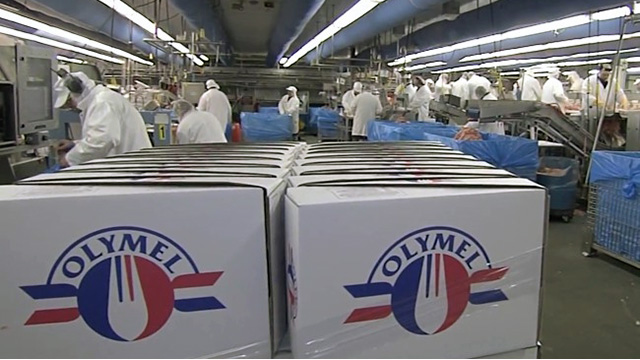As a result, the company has decided to reduce the total number of hogs slaughtered by about 1.5 million annually.
“You’ll understand that with such a reduction, the closure of one of the four slaughtering, cutting and deboning plants in Quebec was inevitable,” Gervais said.
The plant made headlines in 2021 when a four-month strike by workers ground production to a halt and led to concerns that thousands of pigs would be euthanized because of overcrowding on farms.
Gervais said the decision to close the plant wasn’t easy and insisted it wasn’t aimed at any one region.
The Vallée-Jonction plant, he said, was chosen because of the difficulty of recruiting workers in the region, which has low unemployment, and the poor state of the facilities, which he said would require nearly $40 million in renovations. The company is open to relocating any of the laid-off workers who want to work at Olymel’s three remaining slaughterhouses or its other facilities, Gervais added.
He said the plant’s operations would wind down gradually over the next eight months, with a final closure on Dec. 22.
The head of the union representing workers criticized Olymel for only telling employees about the closure on Friday morning, after the news had leaked to the papers.
“It’s just like Olymel, (for us) to learn of the closure of the plant from the media before they confirm it to us,” Martin Maurice said. He insisted the Beauce plant was the company’s most profitable facility and that efforts had been made to improve it, even though it hadn’t benefited from the $150 million in public money the company received two years ago to help it become more competitive.
Maurice said many of the plant’s employees have worked for the company for decades, adding that many won’t want to relocate.
It’s only the latest closure for Olymel, which announced earlier this year it would shutter two plants, in Blainville, Que., and Laval, Que.
Citing problems such as rising costs and trade issues with China, the company has said it needed to reorganize its operations to be more efficient and to focus on the domestic market and higher-value products.
Several unions and politicians took to social media to criticize the closure or to express sympathy with the laid off workers.
“We’ll be there to support the workers in finding a job or getting requalified,” Quebec Premier François Legault wrote on social media.
Agriculture Minister André Lamontagne, for his part, acknowledged the “difficult context” faced by pork producers and promised that work was underway to ensure the sustainability of the sector.
The president of a major farmers group — Union des producteurs agricoles — said the closure is a major blow to the province’s pork producers, who it said are among the most successful in the world.
“Today’s announcement is the opposite of the efforts, investments and sacrifices of breeders. They deserve better, period,” said UPA president Martin Caron, who called for the provincial government to carry out a “neutral and independent” look at the problems plaguing the industry.
Quebec is the biggest pork producer in the Canada, with 31 per cent of the country’s inventory as of 2021, according to Agriculture and Agri-Food Canada.













